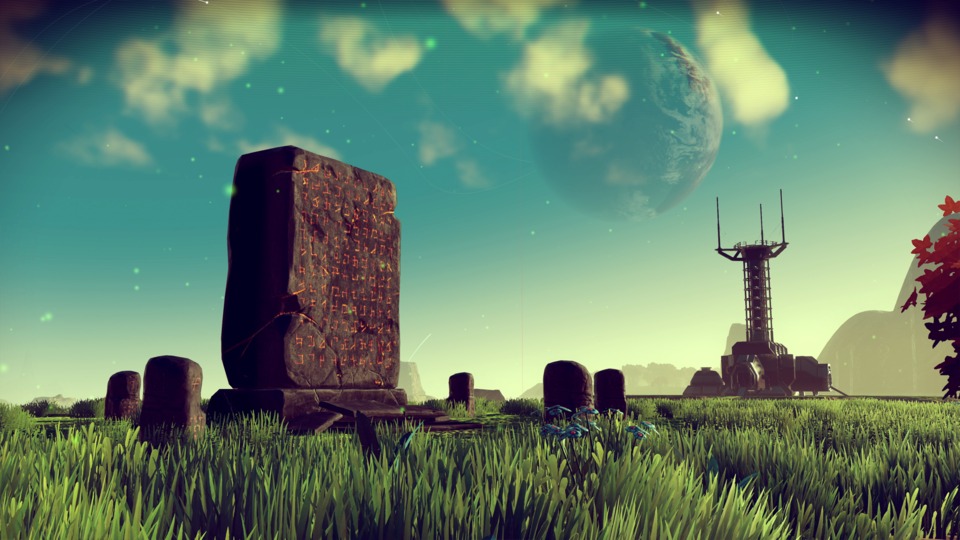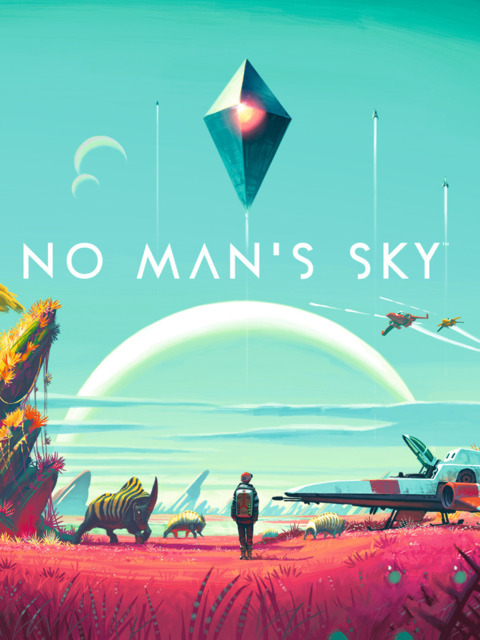
The opening twenty minutes of No Man’s Sky sum up the whole of the experience better than two years of marketing and interviews ever could. You’re an anonymous explorer crashed on a planet you’ve never visited before, desperate to find the resources you need to repair your ship and leave. What follows is an awkward fumbling around with systems you don’t quite understand, broken up by frequent moments of curiosity and awe from the world around you. Once you actually lift off and make your exit, a question enters your mind, the same one that so many asked in the lead-up to the game’s release.
“What do I do?”
At any one point, No Man’s Sky will offer you a multitude of answers to that question, many of which are in conflict with one another. At its best, it’s a spectacle; a journey though an endless series of undiscovered worlds, all waiting for you to make your mark on them. At its worst, it’s a clunky, unfocused and often self-conscious experience that seems to frequently get in its own way.
The time spent in your first star system can be rough. You see a cluster of planets in front of you that can be visited in any order you’d like. Once you make your choice, you pulse drive forward to your destination. The feeling of breaking through the atmosphere of a new planet to unveil its terrain never gets old. Even if what you land on ends up being underwhelming, all you need to do is look up at the stars to see a handful of other planets waiting for you, like a long table full of gifts that only you can unwrap. Somewhere out there is a world that you’ll want to stay in for hours, either due to its beauty, plentiful resources, or both.
It’s the latter of those two where things get complicated. Very quickly you’ll find that you can’t carry a lot in your suit or on your ship, so your goal is find upgrades for them as soon as possible. That’s where the mining comes in. Resources are everything in No Man’s Sky. You need them to refill your life support, to fuel your ship, to craft new items or to interact with the NPCs sitting in the bases you stumble upon. The limiting of those resources and your slow ascent towards being able to do more with them is the whole of the gameplay loop, turning your aimless exploration into a grind more often than not, especially in the early game. You’re encouraged to discover and file everything you see on a planet and are rewarded with credits for doing so. Those credits can then be spent on bigger purses to put more resources in, which will then lead to more credits to buy bigger purses for even more resources and so on.
For the sake of variety, you can visit monoliths to uncover secrets about one of the alien races. This almost always leads to you learning more of their language, which is to your benefit when, you guessed it, trading resources. There are only three races; the ertzaz-Klingon Vy’Keen, the business-minded Gek, and the heavily-visored Korvax, and typically one will be the dominant presence in a particular star system. Depending on how your interaction goes, you can build or ruin your standing with their people. The interactions themselves are very thin. They will almost always be seated alone in a base and you can make a choice that will either end in a binary pass or fail condition. You then leave to never see or speak to them again.
Ironically, it’s the frequency of these interactions and the lack of variety within them that makes the world of No Man’s Sky seem infinitely smaller. In the whole of the galaxy, there are only three sapient races. Also, they landed on all of these planets before you discovered and named them. Their inclusion feels tacked on and undercooked, which can be said for a lot of the problems with No Man’s Sky as a whole.
It feels as if the notion of endless unhindered exploration was so overwhelming that goals and barriers were added at the last minute, even if just remind you that you’re playing a game. The story, which barely exists, feels like it’s there simply because someone decided it needed one. Atlas is leading you to the center of the universe because… you needed an end goal. Sentinels exist everywhere because you needed an antagonist. But did you really?
Exploration is only appealing with the promise of finding new things. The procedural nature of No Man’s Sky means that it won’t take you very long to realize how similar those things are to each other, each new planet starting to feel a little too much like one you’ve been on before, as if you were just sold on a brand new Malibu Stacy doll only to find that nothing has changed other than her hat. Soon enough, every animal starts to feel like a jumble of the same body parts. You will enter a base already knowing what to say to the bored Vy’Keen waiting in his seat; already having figured out the pattern to the puzzle terminal because you’ve solved dozens before it.
All of the “game” parts of No Man’s Sky seem designed specifically to prolong this feeling for as long as possible, to keep you on the other side of the curtain, unaware of the Wizard’s machinations. It seems so terrified that you’ll find the seams that you’ll want to stop playing as soon as that moment occurs.
My favorite time with the game was rather late in my playthrough, long after I’d translated most of the alien languages, built a hyper drive, and bought a ship so large that I’d never fill all of the slots in its inventory. I’d leveled my multi-tool so much that mining and combat were both trivial. Literally all the game needed me to do was go forward.
But instead I stopped. I quite liked the planet I was on. The climate was manageable and there were gorgeous trees everywhere I turned. At night the sky would turn purple and those same trees would seem to glow in the distance. I parked my ship at a beacon and just started to walk, throwing on my favorite podcast in the background as I explored. Soon enough, I found a complex series of caves that seemingly never ended. I must have spent a solid hour simply walking around, taking in the sights, wondering where this was all going to lead me. When I finally returned to the surface, I looked up to see a series of ominous rock formations, just flowing in the air above me, like islands. I stood there for a while, just taking it all in, amazed by its beauty but somewhat saddened that I had no one to share it with.
That sense of solitude, feeling insignificant in a vast world that doesn’t care if you interact with it is at the heart of No Man’s Sky. Yet there is nothing quite like finding a place within it that speaks to you in a certain way, even if only for a brief moment. You will, most likely, be the only person to ever see it. There is something equally empowering and tragic about that.
That is why, for all of its various faults, No Man’s Sky is often hard to put down. It’s a confliction of ideas, seemingly pushing you away from this untethered experience that it’s afraid of you having, while being equally unaware that’s where it’s greatest strengths lie.

Log in to comment